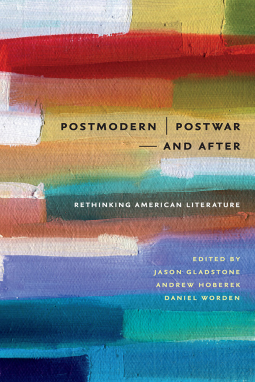
Postmodern/Postwar and After
Rethinking American Literature
by Jason Gladstone, Andrew Hoberek, and Daniel Worden
This title was previously available on NetGalley and is now archived.
Send NetGalley books directly to your Kindle or Kindle app
1
To read on a Kindle or Kindle app, please add kindle@netgalley.com as an approved email address to receive files in your Amazon account. Click here for step-by-step instructions.
2
Also find your Kindle email address within your Amazon account, and enter it here.
Pub Date Jul 01 2016 | Archive Date Jul 01 2016
University of Iowa Press | The New American Canon
Description
The first section of essays returns to the category of the “post-modern” and argues for the usefulness of key concepts and themes from postmodernism to the study of contemporary literature, or reevaluates postmodernism in light of recent developments in the field and historical and economic changes in the late twentieth and early twenty-first centuries. These essays take the contemporary abandonments of postmodernism as an occasion to assess the current states of postmodernity. After that, the essays move to address the critical shift away from postmodernism as a description of the present, and toward a new sense of postmodernism as just one category among many that scholars can use to describe the recent past. The final section looks forward and explores the question of what comes after the postwar/postmodern.
Taken together, these essays from leading and emerging scholars on the state of twenty-first-century literary studies provide a number of frameworks for approaching contemporary literature as influenced by, yet distinct from, postmodernism. The result is an indispensable guide that seeks to represent and understand the major overhauling of postwar American literary studies that is currently underway.
Advance Praise
“Postmodern/Postwar—and After is a smart, timely, and impressively comprehensive collection of essays. Anyone interested in becoming acquainted with current trends and debates in the field of contemporary literature would do well to read this book.”—Michael LeMahieu, author, Fictions of Fact and Value: The Erasure of Logical Positivism in American Literature, 1945–1975
“This is what a collection of essays should be: wide-ranging, superbly edited, and packed with the work of first-rate scholars. This is essential reading for anyone interested in postmodernism, contemporary literature, and the question of how to periodize the writing of the last six decades.”—Timothy Melley, author, The Covert Sphere: Secrecy, Fiction, and the National Security State
Available Editions
| EDITION | Paperback |
| ISBN | 9781609384272 |
| PRICE | $65.00 (USD) |
Links
Featured Reviews
 Earl M, Reviewer
Earl M, Reviewer
The collection of essays in Postmodern/Postwar and After, edited by Jason Gladstone, Andrew Hoberek, and Daniel Worden, is both wide ranging and theoretically rigorous. This collection will likely appeal more to academics, or former academics like myself, who enjoy both literature and thinking about literature.
A strength of the book, from my perspective, is that it establishes a contextualization through historicizing the periods or styles of writing, then manages to present a path forward without completely disregarding the past. In other words, while many seem to want to completely dismiss postmodernism for its faults and ignore any insights (or worse, claim those insights as being from something else altogether) the general idea here is one of taking the good and leaving the rest. What constitutes the good and bad is certainly subjective and will differ from person to person.
As Michael Docherty says in a footnote to his US Studies Online essay about Richard Yates, Postmodern/Postwar and After talks about "meld[ing] postmodernism’s formal playfulness and self-reflexivity with the social and affective concerns of realism." It is this idea of moving forward with every tool we have learned over the years even if we didn't care for how they were first implemented that appeals to me.
I would recommend this not only to academics but those readers who enjoy thinking about where fiction has been and where it is going. While academic in scope and tone the writing is, for the most part, accessible to most readers.
Reviewed from a copy made available by the publisher via NetGalley.



